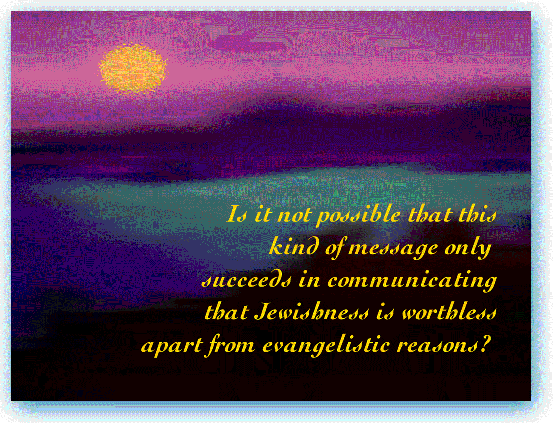Something Of Their Own

By: Tsvi Sadan
|
| ||
|
Why do the Jewish people who believe in the Messiah need a movement of
their own? Would it not be better if all of them quietly merged into one
of the myriad of the well-established churches in the countries where
they live? Do they not, after all, believe in the same things? The
answer to this complex question can be summarized in one sentence:
Intuitively, Messianic Jews know that “Between Jesus and the Jews stands
the Christian Church.”#1
I have no quarrel with the Jewish community's unwillingness to accept Christianity. There is no need for it. I am, however, convinced that rejecting Jesus and the teachings of the apostles is a tragic mistake that carries tragic consequences. The antidote Messianic Judaism can offer to the Jewish community is the ability to distinguish between Jesus and Christianity.
|
||
| I have no quarrel with the Jewish community's unwillingness to accept Christianity. |
Messianic Judaism, however, often fails to make this important
distinction. Jewish believers still try to clothe Christianity with a Tallis and hope that the Jewish people will buy the package. Calling the Apostle Paul “Rav Shaul,” for example, which apart from being scripturally misleading, is nothing more than (unimportant) semantics.
Is calling Paul “Rabbi Shaul” the correct response to the charge that Messianic Jews are converts to Christianity who take on the appearance of Jews in order to deceive others into believing in Jesus?
To be an effective witness to the gospel of Yeshua (Jesus), Israel's Messiah, the
Messianic movement ought to stop assuming that her message is only that
of Yeshua (Jesus). For example, many of us practice Jewish customs for one reason
only: to be able to appeal to the Jewish community; be a “Greek to the
Greek,” as they say. Is this what Yeshua teaches us? Is it not possible
that this kind of message only succeeds in communicating that Jewishness
is worthless apart from evangelistic reasons?
|
|
|
On the one
hand, we use distinctly Christian titles, such as Reverend Cohen, Pastor
Levi, and “Deacon” Katz. On the other hand, Gentile believers use
distinctly Jewish titles, such as “Rabbi” O’Mally, “Chazzan” Olson, and
“Shamash” Jones. Is it any wonder then, that the Jewish community
charges us with deception? Why, indeed, should any other Jew believe the
Messianic movement's claim to be “authentically Jewish” when our
Yarmulke-wearing members barbecue hot dogs on Shabbat?
How then can the Messianic movement become a more effective witness to the gospel of Yeshua? How can it demonstrate more persuasively that its beliefs are true to the spirit of the TaNaKH? It must begin with demonstrated respect for the Torah. It is inconceivable that the Jewish people can survive as a people without the Torah. It is the Torah which turns the twelve tribes into one nation and it is the Torah which gives them a purpose. Showing disregard to the Torah can only mean disrespect to G–d. Furthermore, in exhibiting respect to the Torah (obeying it), Messianic Jews must also demonstrate that there is life beyond rabbinical Judaism. Messianic Judaism needs to bring the vitality of Yeshua into its interpretation and application of the commandments. What this means, for example, is that Messianic Jews can “rest” on Shabbat according to their definition of what work is. In this way, they can rightly insist that they keep the Shabbat, albeit according to their own understanding of what “rest” means. In adopting this approach, the Messianic Movement will be able to substantiate the claim that following Yeshua does not threaten Jewish existence. On the contrary, guided by the words of her L–rd in living out the Torah, the Messianic Movement will be able to demonstrate that without Yeshua, Judaism is nothing more than a pale reflection of what G–d intended it to be.
|
||
|
|
| |
#1 Jakob Jocz, The Jewish People and Jesus Christ • (Grand Rapids: Baker
Book House, 3rd ed., © 1979: 96).
Tsvi Sadan is the Editor of Kivuun, an Israeli monthly magazine
written from the perspective of the “Y’hudim Meshichim” (Messianic Jews.) He is also working on a PhD at Hebrew University in Jerusalem and the first ever Koine ºGreek Dictionary in Modern Hebrew. The first volume of that has been published in Israel this summer. For those interested in more information about the Sadans, Kivuun, and its activities, feel free to contact Teknigrammaton.
Something Of Their Own is © Copyright 1999 by CHAZON ONLINE© and CHAZON MAGAZINE© .. All rights reserved.
.